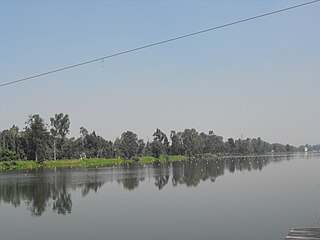Related Research Articles

The men's field hockey tournament at the 1968 Summer Olympics was the 11th edition of the field hockey event for men at the Summer Olympics. It took place over a fourteen-day period beginning on 13 October, and culminated with the medal finals on 26 October. All games were played at the Municipal Stadium in Mexico City, Mexico.

Egypt, which is represented by the Egyptian Olympic Committee (EOC), competed at the 1996 Summer Olympics in Atlanta, United States from July 19 to August 4, 1996. Twenty-nine Egyptian athletes, twenty-seven men and two women, competed in boxing, handball, judo, rowing, shooting, swimming, weightlifting, and wrestling, but the nation did not win any medals.

Uganda competed at the 1972 Summer Olympics in Munich, West Germany which were held from 26 August to 11 September 1972. The nation's delegation consisted of 33 athletes: seventeen field hockey players, eight boxers and eight track and field athletes
Andrés Aldama Cabrera is a retired amateur Cuban boxer, who won the light welterweight silver medal at the 1976 Summer Olympics and the Welterweight gold medal at the 1980 Summer Olympics.

New Zealand competed at the 1924 Summer Olympics in Paris, France. The team consisted of four competitors: an athlete, a boxer, and two swimmers. Porritt was also the team's manager, and he won the nation's first medal in athletics.

Uganda competed at the 1968 Summer Olympics which were held in Mexico City, Mexico from 12 to 27 October. The 1968 Summer Olympics were Uganda's fourth entry into an Olympic Games. Eleven athletes attended the Games to represent Uganda, eight boxers and three in track and field events.

Carmelo Ambrosio Robledo was an Argentine boxer who competed in the 1928 Summer Olympics and in the 1932 Summer Olympics.
Søren Marinus Jensen was a Danish sport wrestler who competed in the 1906 Intercalated Games and the 1908 and 1912 Summer Olympics. He won medals at each Games; however, the gold medals he won at the 1906 Games are no longer considered to be Olympic medals. He remains Denmark's most successful wrestler at the Olympics. In addition, he was World Champion in 1905 and won multiple European championship silver medals.
Georgi Kostadinov is a former boxer from Bulgaria. He competed at the 1972 Summer Olympics and the 1976 Summer Olympics.
Carlos José Tamara Paternina is a Colombian professional boxer, who participated in the 2004 Summer Olympics. There he was defeated in the second round by Italy's Alfonso Pinto in the Light Flyweight (48 kg) division. A year earlier he won the silver medal at the Pan American Games.
Alison Rachel Fitch is a New Zealand swimming competitor. She won a bronze medal in the 4 × 200 m freestyle relay at the 2006 Commonwealth Games.
Daniel Ploug Jorgensen is an American former competition swimmer who represented the United States at two consecutive Olympic Games.
Gaston Antoine Mercier was a French rower who competed in the 1952 Summer Olympics, in the 1956 Summer Olympics, and in the 1960 Summer Olympics.
The men's coxed fours event was part of the rowing programme at the 1924 Summer Olympics. The competition, the fourth appearance of the event, was held from 13 to 17 July 1924 on the river Seine.
Desmond "Des" Ronald Thomson is a former racing cyclist from New Zealand.
Gabriel Hernández Romero was a male boxer from the Dominican Republic, who competed for his native country at the 1996 Summer Olympics in Atlanta, Georgia. There he was stopped in the first round of the men's light heavyweight division by South Africa's Sybrand Botes (11-16).
These are the results of the men's team all-around competition, one of eight events for male competitors in artistic gymnastics at the 1960 Summer Olympics in Rome.
Anastasios "Tasos" Bountouris is a Greek sailor who competed at six Olympics between 1976 and 1996. He is the first Greek to compete at six Olympic Games, an achievement so far matched only by shooter Agathi Kassoumi.
Jegbefumere Albert is a Nigerian boxer who competed in the light heavyweight division. At the 2000 Summer Olympics, Albert was defeated by Rudolf Kraj from the Czech Republic during the quarterfinal match. In 2002 Commonwealth Games Jegbefumere Albert defeated Joseph Lubega (Ugandan) in the final to win a gold medal for Nigeria.

The men's coxed eight competition at the 1968 Summer Olympics took place at Virgilio Uribe Rowing and Canoeing Course, Mexico City, Mexico. It was held from 13 to 19 October and was won by the team from West Germany, with the teams from Australia and the Soviet Union claiming silver and bronze respectively.
References
- 1 2 3 Evans, Hilary; Gjerde, Arild; Heijmans, Jeroen; Mallon, Bill. "Charles Lubulwa Olympic Results". Olympics at Sports-Reference.com. Sports Reference LLC . Retrieved 23 December 2018.
- 1 2 Kanyike, Swaib Raul (14 December 2015). "A Tale of Three Boxing Brothers". The Daily Monitor. Retrieved 8 January 2020.
- 1 2 3 4 5 6 7 8 9 "Lubulwa blames his current state on a lost medal". Daily Monitor. 22 April 2015. Retrieved 6 January 2020.
- ↑ Evans, Hilary; Gjerde, Arild; Heijmans, Jeroen; Mallon, Bill. "Uganda". Olympics at Sports-Reference.com. Sports Reference LLC . Retrieved 6 January 2020.
- ↑ Evans, Hilary; Gjerde, Arild; Heijmans, Jeroen; Mallon, Bill. "Boxing at the 1980 Moskva Summer Games: Men's Light-Flyweight Round One". Olympics at Sports-Reference.com. Sports Reference LLC . Retrieved 6 January 2020.
- 1 2 Evans, Hilary; Gjerde, Arild; Heijmans, Jeroen; Mallon, Bill. "György Gedó". Olympics at Sports-Reference.com. Sports Reference LLC . Retrieved 6 January 2020.
- ↑ Evans, Hilary; Gjerde, Arild; Heijmans, Jeroen; Mallon, Bill. "Blessing Onoko". Olympics at Sports-Reference.com. Sports Reference LLC . Retrieved 8 January 2020.